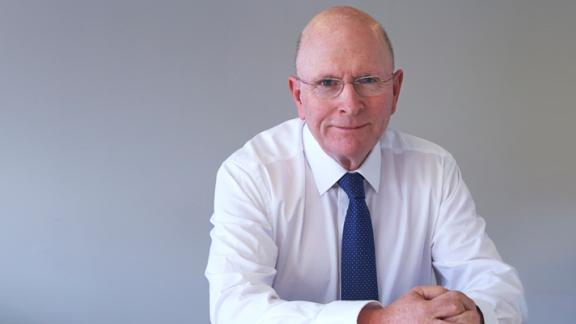NHS Reset: 'Time to fix the plane, even if we are at 35,000 feet'

In this blog, part of a series of comment pieces from NHS Confederation leaders, members and partners, Niall Dickson takes us through how all players in the health sector must be able to shape and influence the future NHS.
There has been an unedifying spat over the last few days on who is responsible for the care home tragedy. Like so many aspects of this crisis, there will be a time for us all to learn what could have been done better; there is already too great a tendency to reach for the retrospectoscope.
For some time now we have made the point that the number of discharges to homes has actually fallen during the crisis and that when hospitals were discharging patients to create capacity the levels of COVID-19 infections were very low indeed. And the idea that doctors or indeed any other staff would act in such a cavalier manner is fanciful. The fact that it is an international phenomenon suggests it is more complex than some are suggesting.
At the same time, casting aspersions in the other direction is not helpful either. Mistakes have been made at all levels. Nor should we deny that tensions exist at national level between organisations representing or responsible for health on the one hand and care on the other. There are also variable local relationships – in some places they are not just good but much improved by the crisis, while in others there is resentment and, for example in the case of care homes, a feeling of being neglected and let down by everyone.
Old feuds
We also need to confront the reality of resentment in some quarters towards hospitals, not just from social care but within the health service itself. Often it is not expressed openly but it is no less real for that. At times of funding pressure and crisis it becomes more obvious. And in the current emergency, there is no doubt that in primary, community as well as social care, many leaders and front-line staff feel they have been treated like second class citizens when compared to their hospital colleagues.
The immediate cause is obvious. There was an overriding priority to prevent the acute sector from being overwhelmed and every effort was made to prevent that. And it worked.
But beneath this is the fact that we have a fractured system where traditionally the funding, the prestige and the glory have been vested in large teaching hospitals. The research, the dramatic saving of lives and the visible manifestation of the NHS are all evident for the rest of society to marvel at. In all my years at the BBC, it was always too easy to film in hospitals where obligingly all the players were dressed up like actors on a stage, their roles clear and the backdrop perfect for the action to begin.
It has led over the years to politicians of all kinds to bleat about the importance of prevention, of health inequality, of mental health and services in the community, but when it comes to dividing what additional resource there may be, public health, primary care, community services and social care (especially) have ended with smaller pieces of the pie.
At its worst, this has encouraged a holier than thou view among the ‘victims’ in which simple truths are ignored - such as the fact that we all rely on the care and dedication of hospital staff to look after us and our loved ones at some of the most critical moments in our lives. Equally it has encouraged a view within parts of the acute sector (admittedly now much more in the past than the present) that they are islands of excellence set in seas of mediocrity.
Moving on
Some of the most interesting and thoughtful participants in this debate are frontline staff and leaders who have crossed the divide between sectors and who understand the genuine pressures and frustrations in different parts of the system. There is also a growing cadre of leaders who understand that depicting the acute sector as greedy and wasteful is as foolish as seeing it as the default residence for the brightest and the best.
This all matters much more than a myopic blame game between parts of the centre or between local services.
In the next few months, the government must decide the future shape of the service in England. In recent years the service, led by NHS England, has sought to navigate the health service to a better place, despite the impediments and detritus of the 2012 Act. The Long Term Plan’s ambition to invest more of the extra resource promised for the NHS into community services and primary care was important as a signal and a commitment to change direction.
But we are now in a different place and politicians will need to play their part. This forthcoming conversation needs to include the arrangements that will affect the responsibilities and accountabilities throughout health and care. We must make sure the lessons of COVID-19 are understood, among which are the need to promote the interdependency, not the old rivalries, of our sector.
Top down versus bottom up
And that certainly means sorting out the relationships between the centre and the service, including that we address fears that the Level 4 command and control setting will become too tempting for the centre to abandon.
Yet in many ways it has been through liberation from control and excessive regulation that services have been transformed in recent weeks. If there is one overriding lesson from issues such as PPE and testing, it is surely that the national bit only delivers when it works with the grain of local solutions. It is a message we have sought to convey as the government develops Test, Track and Trace.
The lesson must be that we now think through national governance and regulatory models. In the same vein, we need greater clarity and consistency around the role of regional outposts, albeit that there is backing among front line leaders in some areas for the way regions have supported them during the crisis. And it is vital we sort out the critical role and powers of integrated care systems as more than NHS overseers, the future of the commissioning function at local level, the autonomy and accountability of providers of all kinds at a place level and how primary and social care can be given voice and brought into an integrated whole.
And on reflection, that may well be the wrong way round – should we not start at neighbourhood level and work our way up?
Join in
In this, all the players in our sector – leaders, clinicians, and support staff, must be able to help shape and influence, something that is especially hard to do when so much is going on managing the crisis and resuming services. As one leader observed recently: “We need to do it, but it is a bit like fixing the plane at 35,000 feet.”
Of course, as I am sure I have said before, creating optimal structures and powers on their own will not resolve cultural issues deep in the DNA at all levels of our health and care systems. The international evidence tells us that. But structures and the powers do matter. They will help to determine if we free up or constrain local energy and initiative, and whether or not we can develop joined-up services which thrive on their interdependence.
We have had such a positive response to our NHS Reset campaign and we are keen to build on that, harnessing the ideas and innovations that are making a difference all over the service and gathering views about how we can increase speed and scale. Please do spread the word and encourage your teams to join the debate.
Niall Dickson is chief executive of the NHS Confederation. Follow them on Twitter @NHSC_Niall and @NHSConfed



